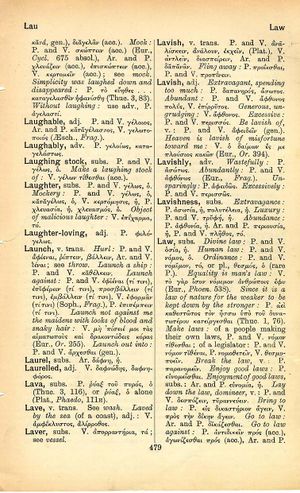law
Ἒστιν ὃ μὲν χείρων, ὃ δ' ἀμείνων ἔργον ἕκαστον· οὐδεὶς δ' ἀνθρώπων αὐτὸς ἅπαντα σοφός. (Theognis 901f.) → One is worse, the other better at each deed, but no man is wise in all things.
English > Greek (Woodhouse)
subs.
Divine law: P. and V. ὁσία, ἡ. Human law: P. and V. νόμος, ὁ. Ordinance: P. and V. νόμιμον, τό, or pl., θεσμός, ὁ (rare P.). Equality is man's law: V. τὸ γὰρ ἴσον νόμιμον ἀνθρώποις ἔφυ (Eur., Phoen. 538). Since it is a law of nature for the weaker to be kept down by the stronger: P. ἀεὶ καθεστῶτος τὸν ἥσσω ὑπὸ τοῦ δυνατωτέρου κατείργεσθαι (Thuc. 1, 76). Make laws: of a people making their own laws, P. and V. νόμον τίθεσθαι; of a legislator: P. and V. νόμον τιθέναι. P. νομοθετεῖν, V. θεσμοποεῖν. Break the law, v.: P. παρανομεῖν. Enjoy good laws: P. εὐνομεῖσθαι. Enjoyment of good laws, subs.: Ar. and P. εὐνομία, ἡ. Lay down the law, domineer, v.; P. and V. δεσπόζειν, τυραννεύειν. Bring to law: P. εἰς δικαστήριον ἄγειν, V. πρὸς τὴν δίκην ἄγειν. Go to law: Ar. and P. δικάζεσθαι. Go to law against: P. ἀντιδικεῖν πρός (acc.), ἀγωνίζεσθαι πρός (acc.), Ar. and P. δικάζεσθαι (dat.). The laws of health: P. τὸ ὑγιεινόν. The laws of nature: P. τὰ τῆς φύσεως.

